Unit 2 I'll help to clean up the city parks Section A 第一课时 课件+嵌入音频(共23张PPT)
文档属性
| 名称 | Unit 2 I'll help to clean up the city parks Section A 第一课时 课件+嵌入音频(共23张PPT) | 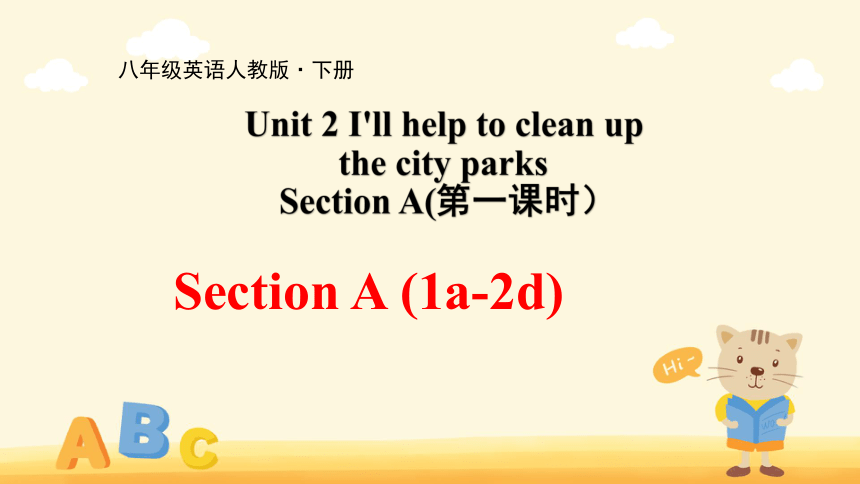 | |
| 格式 | pptx | ||
| 文件大小 | 3.7MB | ||
| 资源类型 | 教案 | ||
| 版本资源 | 人教新目标(Go for it)版 | ||
| 科目 | 英语 | ||
| 更新时间 | 2024-03-02 21:40:11 | ||
图片预览

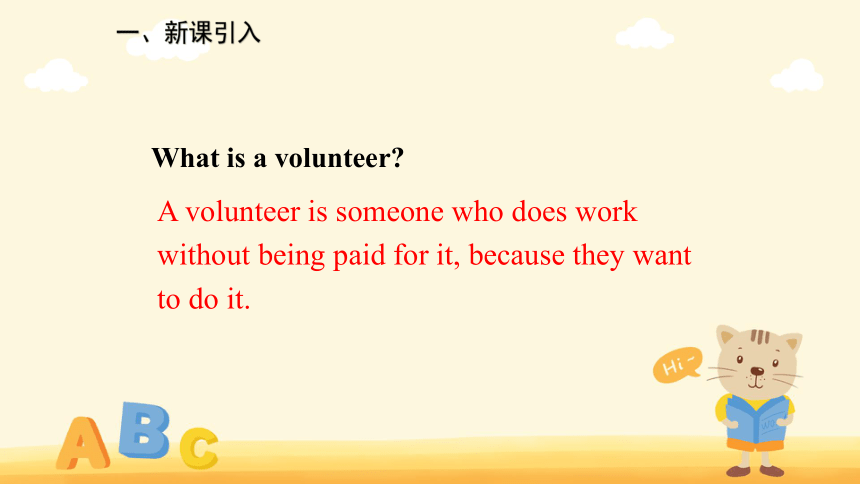
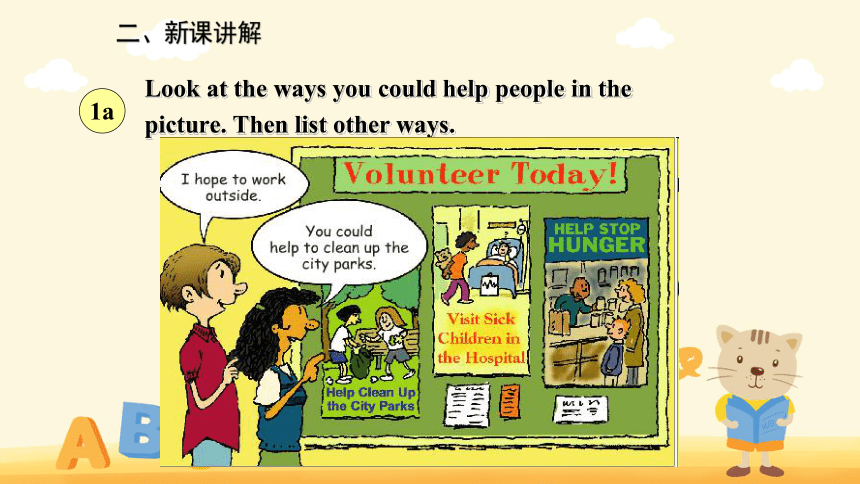
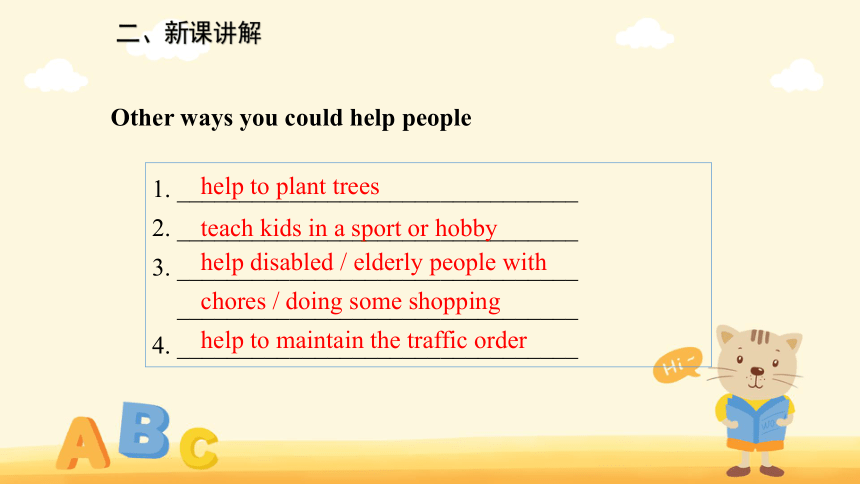
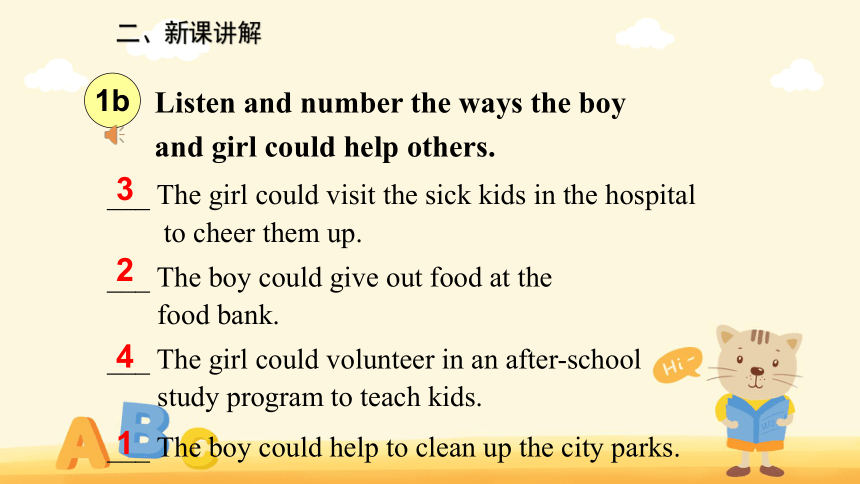
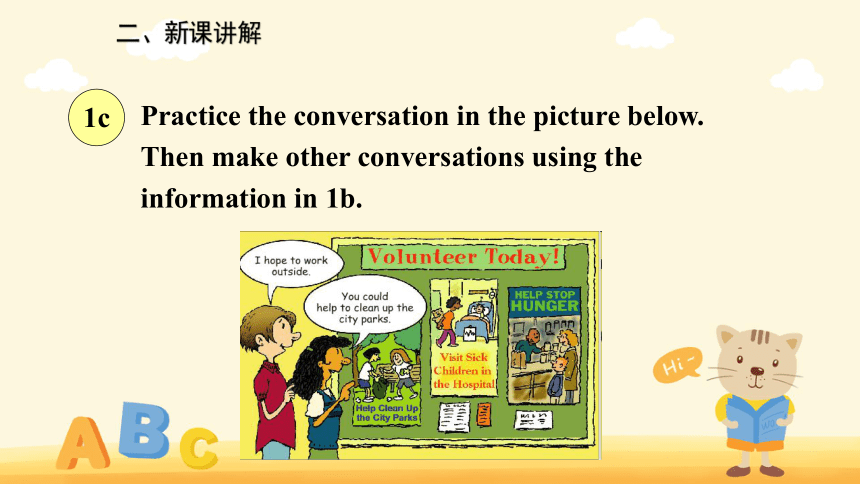
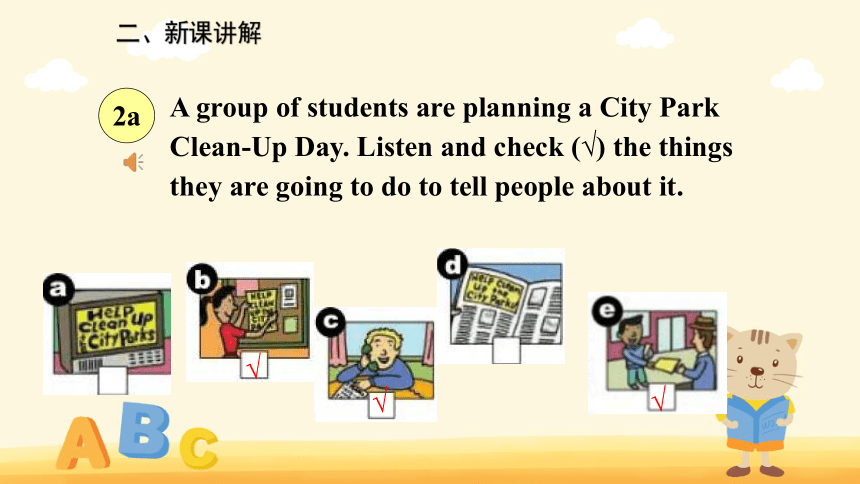
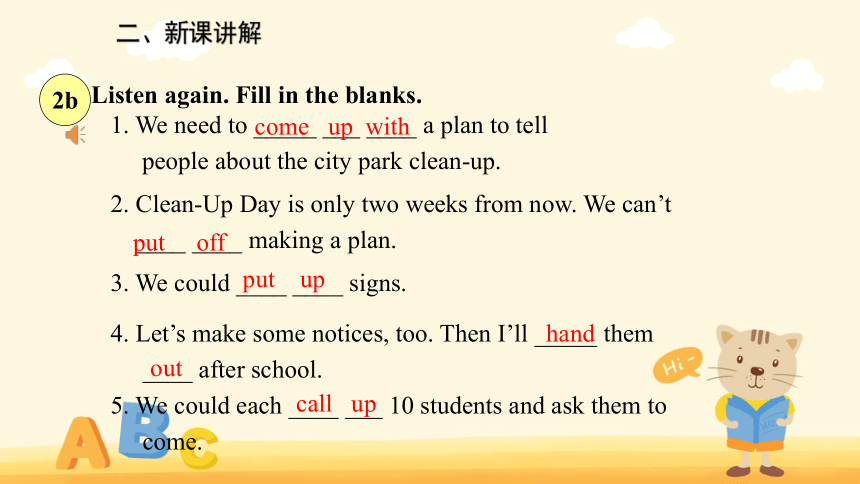
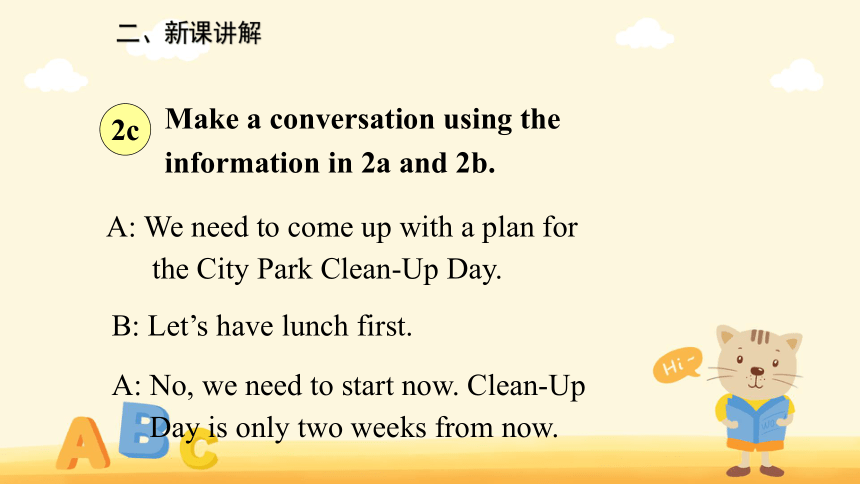
文档简介
(共23张PPT)
Unit 2 I'll help to clean up the city parks
Section A(第一课时)
八年级英语人教版·下册
Section A (1a-2d)
一、新课引入
A volunteer is someone who does work without being paid for it, because they want to do it.
What is a volunteer
二、新课讲解
Look at the ways you could help people in the picture. Then list other ways.
1a
二、新课讲解
1. ________________________________
2. ________________________________
3. ________________________________
________________________________
4. ________________________________
Other ways you could help people
teach kids in a sport or hobby
help disabled / elderly people with
chores / doing some shopping
help to plant trees
help to maintain the traffic order
二、新课讲解
Listen and number the ways the boy and girl could help others.
1b
___ The girl could visit the sick kids in the hospital to cheer them up.
___ The boy could give out food at the
food bank.
___ The girl could volunteer in an after-school
study program to teach kids.
___ The boy could help to clean up the city parks.
1
2
3
4
二、新课讲解
1c
Practice the conversation in the picture below. Then make other conversations using the information in 1b.
二、新课讲解
A group of students are planning a City Park Clean-Up Day. Listen and check (√) the things they are going to do to tell people about it.
2a
√
√
√
二、新课讲解
1. We need to _____ ___ ____ a plan to tell
people about the city park clean-up.
2. Clean-Up Day is only two weeks from now. We can’t ____ ____ making a plan.
3. We could ____ ____ signs.
come up with
put off
put up
Listen again. Fill in the blanks.
2b
4. Let’s make some notices, too. Then I’ll _____ them ____ after school.
5. We could each ____ ___ 10 students and ask them to come.
hand
call up
out
Make a conversation using the information in 2a and 2b.
2c
A: We need to come up with a plan for
the City Park Clean-Up Day.
B: Let’s have lunch first.
A: No, we need to start now. Clean-Up
Day is only two weeks from now.
二、新课讲解
二、新课讲解
2d
Role-play the conversation
Helen: Hi, Tom. I’m making some plans to work in an old people’s home this summer.
Tom: Really I did that last summer!
Helen: Oh, what did they ask you to help out with
Tom: Mm… things like reading the newspaper to the old people, or just talking to them.
They told me stories about the past and how things used to be.
Helen: That sounds interesting.
Tom: Yeah, a lot of old people are lonely. We should listen to them and care for
them.
Helen: You’re right. I mean, we’re all going to be old one day, too.
Language points
二、新课讲解
(1) sick adj. (感觉)不适的,生病的 。可以用于系动词后作表语,也可以用来修饰名词作定语)。
e.g. Tom was sick at home.
The nurse is looking after the _______ (生病的男孩).
(2) ill adj. 生病的。可作表语,通常不作定语。
e.g. Alice ____________ (生病) yesterday.
sick boy
1. Visit sick children in the hospital.
was ill / sick
Language points
二、新课讲解
(3) in the hospital 住院 (美语用法)
在英国,人们则多说in hospital。
与之相类似的还有: go to the hospital和go to hospital。
2. They told me stories about the past and how things used to be.
(1) used to 过去经常;以前常常
表示过去的习惯性动作或经常性状态,可用于各
种人称,没有人称和数的变化,后接动词原形。
e.g. I ______________ in London.
我曾经住在伦敦。
Mother _____________________ (过去经常给我们讲故事) before we went to bed.
used to live
used to tell us stories
Language points
二、新课讲解
Language points
二、新课讲解
(2) used to结构的否定形式有两种:didn’t use to
或usedn’t to (只用于英式英语)
e.g. I ________________________________ (过去不喜欢足球), but now I’m a fan.
didn’t use to / usedn’t to like football
(3) used to的一般疑问句句式为:“Did+主语+use to+动词原形+其他 ”或“Used+主语+to+动词原形+其他 ”
e.g. Did you use to drink tea in the afternoon
Used you to drink tea in the afternoon
Language points
二、新课讲解
(4) 短语补充
1) be / get used to 习惯于……;适应于……
(后常跟名词(短语)、代词或动词-ing形式)
2) use ... to do ... 用……做……
(to是不定式符号)
3) be used to do sth. 被用来做……
4) be used for (doing ) sth.
被用于/被用来(做)……
Language points
二、新课讲解
3. Yeah, a lot of old people are lonely.
lonely adj. 孤独的;寂寞的。指精神上感觉孤独、寂寞。(既可作表语也可作定语 )
e.g. In the new city, the old man __________.
在这个新城市,老人觉得很孤独。
Mike said Mr. Smith was ___________ (孤独的男人).
feels lonely
a lonely man
Language points
二、新课讲解
辨析: alone adj. 单独的;独自的 (能作表语,不能作前置定语)
它强调客观上的“独自一人;单独一人”,不表示内心的感受。
adv. 单独地;独自地
Language points
二、新课讲解
4. We need to come up with a plan for the
City Park Clean-up Day.
(1)need为实义动词,“必要”、“必需”。有人称、数和时态的变化,接名词、代词、动名词或带to的不定式作宾语。
e.g. The man needs an English dictionary when he works.
这个人在工作时需要一本英语词典。
Language points
二、新课讲解
(2) clean up 打扫;清理
如果在clean和up间加个连字符号, 它就是名词了, 意为“扫除”。
e.g. You must give your classroom a good clean-up.
你必须对教室进行彻底地打扫。
(3) come up with 提出(观点,看法)
e.g. 他想出了一个绝好的主意。
He has come up with a great idea.
三、归纳小结
ways to help others
offer help:You could…
Volunteering
Outside school:
help the traffic police
work in an old people's home
clean up street lights
clean the chairs in the park
...
At school:
help clean the blackboard
help the teacher to collect and give out exercise books
help classmates to learn their lessons
...
四、强化训练
1) Knives _____________ cutting things.
2) Ice can ______________ build houses in the areas around the North Pole (北极).
3) I ___________ get up late, but now I ________________ getting up early.
4) Most people now ________________ (用汽车) travelling.
are used for
be used to
used to
get / am used to
use cars to go
1. 请选用used 的适当短语填空,使句意完整通顺。
2. 请选用alone或lonely填空,使句意完整通
顺。
1) Old Sam lived _______, but he didn’t feel _______.
2) Han Mei was reading _______ when the teacher came into the classroom.
3) He lives _______ in the _______ street.
alone
lonely
alone
alone
lonely
四、强化训练
五、布置作业
1. Make a conversation about your volunteering. You
can use 2d as a reference.
2. Preview the new words we will use in the next lesson.
Unit 2 I'll help to clean up the city parks
Section A(第一课时)
八年级英语人教版·下册
Section A (1a-2d)
一、新课引入
A volunteer is someone who does work without being paid for it, because they want to do it.
What is a volunteer
二、新课讲解
Look at the ways you could help people in the picture. Then list other ways.
1a
二、新课讲解
1. ________________________________
2. ________________________________
3. ________________________________
________________________________
4. ________________________________
Other ways you could help people
teach kids in a sport or hobby
help disabled / elderly people with
chores / doing some shopping
help to plant trees
help to maintain the traffic order
二、新课讲解
Listen and number the ways the boy and girl could help others.
1b
___ The girl could visit the sick kids in the hospital to cheer them up.
___ The boy could give out food at the
food bank.
___ The girl could volunteer in an after-school
study program to teach kids.
___ The boy could help to clean up the city parks.
1
2
3
4
二、新课讲解
1c
Practice the conversation in the picture below. Then make other conversations using the information in 1b.
二、新课讲解
A group of students are planning a City Park Clean-Up Day. Listen and check (√) the things they are going to do to tell people about it.
2a
√
√
√
二、新课讲解
1. We need to _____ ___ ____ a plan to tell
people about the city park clean-up.
2. Clean-Up Day is only two weeks from now. We can’t ____ ____ making a plan.
3. We could ____ ____ signs.
come up with
put off
put up
Listen again. Fill in the blanks.
2b
4. Let’s make some notices, too. Then I’ll _____ them ____ after school.
5. We could each ____ ___ 10 students and ask them to come.
hand
call up
out
Make a conversation using the information in 2a and 2b.
2c
A: We need to come up with a plan for
the City Park Clean-Up Day.
B: Let’s have lunch first.
A: No, we need to start now. Clean-Up
Day is only two weeks from now.
二、新课讲解
二、新课讲解
2d
Role-play the conversation
Helen: Hi, Tom. I’m making some plans to work in an old people’s home this summer.
Tom: Really I did that last summer!
Helen: Oh, what did they ask you to help out with
Tom: Mm… things like reading the newspaper to the old people, or just talking to them.
They told me stories about the past and how things used to be.
Helen: That sounds interesting.
Tom: Yeah, a lot of old people are lonely. We should listen to them and care for
them.
Helen: You’re right. I mean, we’re all going to be old one day, too.
Language points
二、新课讲解
(1) sick adj. (感觉)不适的,生病的 。可以用于系动词后作表语,也可以用来修饰名词作定语)。
e.g. Tom was sick at home.
The nurse is looking after the _______ (生病的男孩).
(2) ill adj. 生病的。可作表语,通常不作定语。
e.g. Alice ____________ (生病) yesterday.
sick boy
1. Visit sick children in the hospital.
was ill / sick
Language points
二、新课讲解
(3) in the hospital 住院 (美语用法)
在英国,人们则多说in hospital。
与之相类似的还有: go to the hospital和go to hospital。
2. They told me stories about the past and how things used to be.
(1) used to 过去经常;以前常常
表示过去的习惯性动作或经常性状态,可用于各
种人称,没有人称和数的变化,后接动词原形。
e.g. I ______________ in London.
我曾经住在伦敦。
Mother _____________________ (过去经常给我们讲故事) before we went to bed.
used to live
used to tell us stories
Language points
二、新课讲解
Language points
二、新课讲解
(2) used to结构的否定形式有两种:didn’t use to
或usedn’t to (只用于英式英语)
e.g. I ________________________________ (过去不喜欢足球), but now I’m a fan.
didn’t use to / usedn’t to like football
(3) used to的一般疑问句句式为:“Did+主语+use to+动词原形+其他 ”或“Used+主语+to+动词原形+其他 ”
e.g. Did you use to drink tea in the afternoon
Used you to drink tea in the afternoon
Language points
二、新课讲解
(4) 短语补充
1) be / get used to 习惯于……;适应于……
(后常跟名词(短语)、代词或动词-ing形式)
2) use ... to do ... 用……做……
(to是不定式符号)
3) be used to do sth. 被用来做……
4) be used for (doing ) sth.
被用于/被用来(做)……
Language points
二、新课讲解
3. Yeah, a lot of old people are lonely.
lonely adj. 孤独的;寂寞的。指精神上感觉孤独、寂寞。(既可作表语也可作定语 )
e.g. In the new city, the old man __________.
在这个新城市,老人觉得很孤独。
Mike said Mr. Smith was ___________ (孤独的男人).
feels lonely
a lonely man
Language points
二、新课讲解
辨析: alone adj. 单独的;独自的 (能作表语,不能作前置定语)
它强调客观上的“独自一人;单独一人”,不表示内心的感受。
adv. 单独地;独自地
Language points
二、新课讲解
4. We need to come up with a plan for the
City Park Clean-up Day.
(1)need为实义动词,“必要”、“必需”。有人称、数和时态的变化,接名词、代词、动名词或带to的不定式作宾语。
e.g. The man needs an English dictionary when he works.
这个人在工作时需要一本英语词典。
Language points
二、新课讲解
(2) clean up 打扫;清理
如果在clean和up间加个连字符号, 它就是名词了, 意为“扫除”。
e.g. You must give your classroom a good clean-up.
你必须对教室进行彻底地打扫。
(3) come up with 提出(观点,看法)
e.g. 他想出了一个绝好的主意。
He has come up with a great idea.
三、归纳小结
ways to help others
offer help:You could…
Volunteering
Outside school:
help the traffic police
work in an old people's home
clean up street lights
clean the chairs in the park
...
At school:
help clean the blackboard
help the teacher to collect and give out exercise books
help classmates to learn their lessons
...
四、强化训练
1) Knives _____________ cutting things.
2) Ice can ______________ build houses in the areas around the North Pole (北极).
3) I ___________ get up late, but now I ________________ getting up early.
4) Most people now ________________ (用汽车) travelling.
are used for
be used to
used to
get / am used to
use cars to go
1. 请选用used 的适当短语填空,使句意完整通顺。
2. 请选用alone或lonely填空,使句意完整通
顺。
1) Old Sam lived _______, but he didn’t feel _______.
2) Han Mei was reading _______ when the teacher came into the classroom.
3) He lives _______ in the _______ street.
alone
lonely
alone
alone
lonely
四、强化训练
五、布置作业
1. Make a conversation about your volunteering. You
can use 2d as a reference.
2. Preview the new words we will use in the next lesson.
同课章节目录
- Unit 1 What's the matter?
- Section A
- Section B
- Unit 2 I'll help to clean up the city parks.
- Section A
- Section B
- Unit 3 Could you please clean your room?
- Section A
- Section B
- Unit 4 Why don't you talk to your parents?
- Section A
- Section B
- Unit 5 What were you doing when the rainstorm came
- Section A
- Section B
- Review of Units 1-5
- Unit 6 An old man tried to move the mountains.
- Section A
- Section B
- Unit 7 What's the highest mountain in the world?
- Section A
- Section B
- Unit 8 Have you read Treasure Island yet?
- Section A
- Section B
- Unit 9 Have you ever been to a museum?
- Section A
- Section B
- Unit 10 I've had this bike for three years.
- Section A
- Section B
